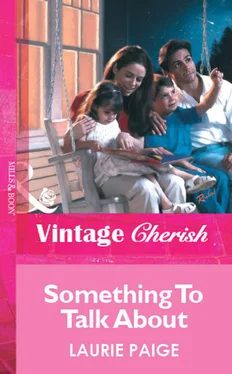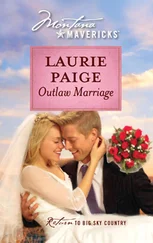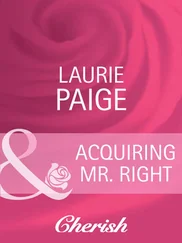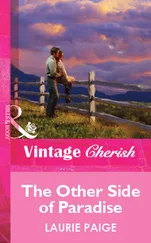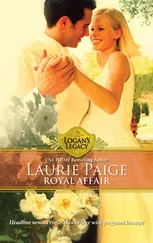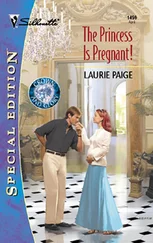Without another word, he pulled a chair over to the swing, stood on it and oiled the hook. Moving back, he advised her to try it. The swing made no noise when she moved.
“Thanks,” she said, injecting sincerity into the word.
“It wasn’t for you. It was for me.” He moved the chair back to its position, then stood near the steps.
When he didn’t leave, she hesitated, then invited him to join her. Expecting him to take the chair, she was startled anew when he settled on the swing with a weary sigh.
“Your leg is bothering you?” she asked, sympathy winning out over other, harder emotions.
“Yeah, and then some,” he agreed wryly.
“I know,” she said softly, remembering the ache that lasted long after the actual pain disappeared.
“Look,” he said, “I didn’t mean to sound weird this afternoon. It’s just that I’m worried about the boy. He’s having a hard time, and he’s…vulnerable.”
“He needs someone. You, I think. It’s good that you’ve been doing things together.”
“You think so?”
She was surprised at the hope in his voice. So the tough cop needed assurances, too. “Absolutely.”
After a few minutes he exhaled deeply and relaxed against the wooden slats. She started the swing to moving. They swished back and forth while crickets chirped and the wind whispered of secrets millions of years old.
She heard the lazy caw of a crow in the alders down by the creek. “The wind raven,” she murmured.
“What?”
Kate stirred self-consciously. “It’s an old story my grandmother told us. She said an Indian woman told it to her grandmother when she was a child. When the raven caws before dawn, when the wind blows down the mountain rather than up the valley, dire happenings are foretold. My grandmother’s mother heard the ravens before her husband and son were killed by a falling tree. My grandmother said she heard the crows down by the creek the night her baby died. And the wind was blowing.”
As if on cue, the cold night air swept around the eaves with a low moan. Her father had explained the house moaned because it wasn’t built right for wind, but as a child, she’d thought the wind and the house knew when tragedy was coming. The hair prickled on the back of her neck.
“Do you believe in myths?”
His voice was as soft, as sorrowful, as that of the wind, its deeper cadence blending with the whisperings of the river alders. The prickle became a tremor that raced through her.
“I believe there are things the mind can comprehend and others that only the heart knows and still others that no one understands.” She spoke barely above a whisper herself.
He moved, turning slightly as if to study her, laying his arm along the back of the swing, crossing his sore knee over the other while he watched her. She became uneasy.
“What bothers you about me?” he asked.
The silence grew—a mound of unsaid words between them. “Your unhappiness,” she said at last. “Your dislike and disapproval for no reason that I know of.”
“I don’t dislike you,” he said, so low she nearly didn’t catch the words.
“Your distrust…of women or everyone?”
His laugh was bitter. “Of life.”
“I understand.”
“I doubt it.” He was back to tough, cynical.
“I was married twelve years ago today. Barely past my twenty-first birthday.”
“It wasn’t a happy union,” he guessed.
“My father didn’t want me to, but nothing would have stopped me, not even a gypsy with a genuine crystal ball that showed me what my life would be like if I went through with the ceremony. I probably knew without the crystal ball.”
“But you did it, anyway.”
“Yes.”
“And?”
“We fought the good fight, one might say, but it didn’t work for us. Not all the love or hope or faith in the world could change what was inevitable.”
“You divorced.”
“No. He died.”
“How?”
She heard the sharpened interest of the experienced cop in the question. She couldn’t decide how much to tell him or if she wanted him to know. Suicide. She hadn’t said the word in four years, and she wasn’t sure she could say it now.
“Suicide?” he said before she could get the word out, again in the deep tone that harmonized with the wind.
A raven cawed. Another answered.
“Yes.” The emptiness returned and with it the memories of a fate she had been powerless to change, although at twenty-one, she had thought she could. By the time she was twenty-nine, she had known she couldn’t.
“Go,” the raven called from the river bank. “Go.”
She rose and went inside without another word.
The wind came up during the night, sluicing down the mountain, pouring into the valley, bringing lightning and the promise of rain. At dawn the rain still held off, but the clouds lingered like a lid clamped over the land, holding in the growing tempest.
Kate rose and dressed in fresh jeans, tank top and a long-sleeved flannel shirt. The temperature was in the low fifties. She put on coffee, then ate her usual bowl of cereal.
Standing by the kitchen windows, she watched the wind toss the branches of the alders. The sky was dark, threatening. Along the edge of the mountain nearest her, she stared at the curtain of white without realizing what it was.
“Hail,” she said as the first white balls began to hit the glass and skip along the grass. She saw it tear through a leaf of a bush, then knock a flower off another.
The garden! The hail would ruin her carefully tended lettuce and beans and sweet peas. It would rip through the broad leaves of the cucumbers, squash and pumpkins. She slipped into old loafers and ran to the garden shed for the drop cloths that served multiple purposes around a ranch.
The wind beat at her, so hard it felt as if it would tear her clothes from her body. The hailstones, all nearly the size of marbles, hit with ferocious tenacity. She secured a corner of the drop cloth with a rock and tried to cover the row of lettuce. The wind whipped the material from her fingers.
“I’ll get it.” Jess reached across her and grabbed the flailing cloth and put it into place. “Get one of those big rocks,” he told his son.
Between the three of them, they got the most vulnerable vegetables covered. As they ran for the house, the rain started, lashing across the land in long, shimmering curtains.
“Wow, I don’t think the weatherman predicted that,” Kate said with a laugh once they were safely inside the kitchen. She tossed towels to her helpers, then dried herself off.
She checked her clothing to make sure she was decent. When she glanced up, Jess was watching her. The quickly hidden flare in his eyes told her he remembered their first meeting. His words of the night before leaped into her mind.
Desire flamed in her, echoing her restless night. She missed the heat, the pleasure of sex, the deep satisfaction and closeness afterward. In those early years of marriage, when hope still reigned, she had sought it eagerly. Later she had tried to use it as a bond to help her husband live in the present, but he had retreated more and more into the past, to places where she had never been and couldn’t go.
“I have coffee,” she said rather abruptly, turning from her guest’s steady perusal. “This feels like a pancake-and-sausage morning to me. How about you?”
“Yeah,” Jeremy said enthusiastically, pulling the towel over his hair as if he were polishing a shoe. He glanced at his father. “Uh, if we have time.”
Only a curmudgeon could have denied the youngster’s eager hunger. Kate looked at Jess. The corners of his mouth tightened, but he nodded.
She threw her towel on top of the washing machine in the adjoining room, then started preparing the meal. Jess and Jeremy followed her example but took seats at the table. She served coffee to the older male and cocoa to the younger one.
Читать дальше
